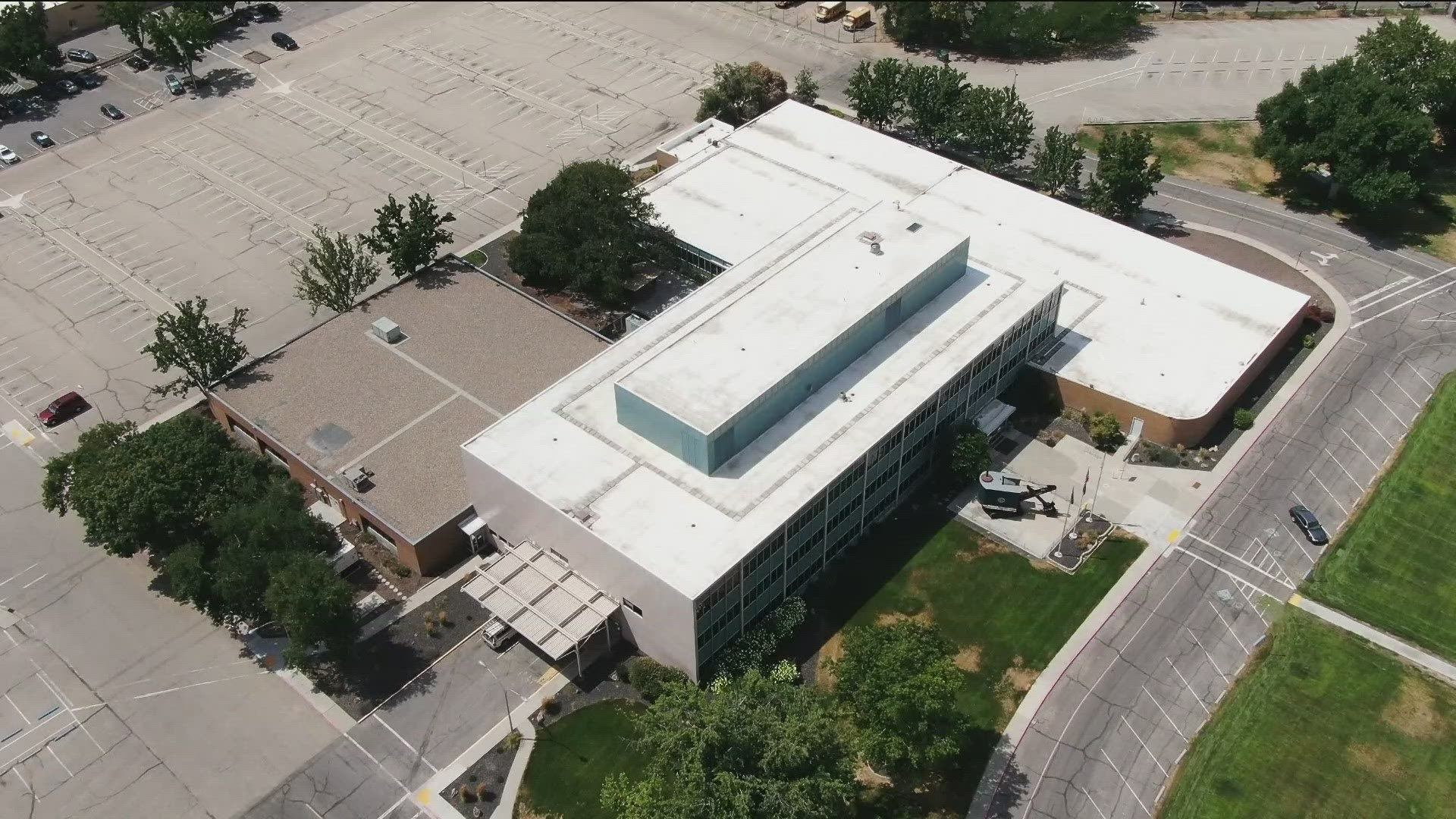BOISE, Idaho — This article originally appeared in the Idaho Press.
Grow has spent the last eight months meeting and negotiating with an array of other lawmakers, experts and stakeholders to try to come up with a major property tax relief proposal for Idaho homeowners, and he’s hopeful his latest draft bill, in addition to at least two others that are in the works, can be a big focus of the upcoming legislative session that convenes Jan. 9.
Grow, a CPA and the new co-chair of the budget-writing Joint Finance-Appropriations Committee, said, “We’ve done three different reductions in income tax rates, and I’ve continued to say that as a CPA, I haven’t had people complain to me about state income tax rates, either as business entities or as individuals. The big complaint is property taxes for homeowners.”
Grow’s proposal, which still is being fine-tuned, calls for earmarking 10% of Idaho’s sales tax revenues to go to property tax relief for homeowners.
That would be done in the form of a state-paid credit against the property tax owed, similar to how the “circuit breaker” state-funded property tax reduction for low-income seniors works. As Grow envisions it, the credit would come to roughly 40% of a homeowner’s property tax bill after the homeowner’s exemption, excluding voter-approved levies, which wouldn’t be subsidized. The relief would total roughly $330 million a year.
“I think structurally, we’re overtaxing our people,” Grow said, as evidenced by the state’s huge budget surplus, now estimated at more than $1.5 billion. “This is a way to return to the homeowners, give them some benefit in property taxes,” he said. “Businesses have been helped by income tax reduction, and landlords have been helped by income tax reduction. But the homeowners have had no real relief that’s substantive.”
Rep. Bruce Skaug, R-Nampa, who’s been working for the past two years on widely supported legislation to increase and re-index the homeowner’s exemption, said, “I like Sen. Grow’s idea. He’s worked very hard on the plan and the bill proposal, which isn’t fully final yet, but I like it a lot. And then I like my bill a lot. So the idea is that we’ll both of us get them printed,” the initial step for introducing legislation in Idaho.
Skaug’s bill on the homeowner’s exemption had more than 40 co-sponsors two years ago, but then-House Revenue & Taxation Committee Chair Steven Harris, R-Meridian, refused to allow it an introductory hearing in his committee. He’s redrafted the bill with some updates and is bringing it back.
“We certainly want one of them to pass,” Skaug told the Idaho Press. “I’m not married to any one bill. I want relief for the homeowners, tax relief. Maybe we’ll end up coming together.”
The latest version of Skaug’s bill would raise the cap on the homeowner’s exemption, now capped at $125,000, to $242,000, and bring back the indexing of the cap to the Idaho housing price index. In 2016, the Legislature froze the exemption, which previously had its maximum amount go up and down with Idaho housing prices. Then, Idaho home prices skyrocketed, resulting in huge tax increases for Idaho homeowners whose exemption remained capped.
“We set the homeowner’s exemption immediately at $242,000, rather than the $125,000 now,” Skaug said. “That’s just where the indexing would be from 2016 if we left it alone as a Legislature. So I’m not doing a tax shift. I’m just recalibrating back to what it had before.”
“It brings immediate relief to homeowners everywhere across the state,” he said, adding, “A lot of it will depend on our tax committee chairmen both in the Senate and the House. We’ll see what Rep. Monks has to say about these bills.”
That would be Rep. Jason Monks, R-Meridian, the newly named chairman of the House Revenue & Taxation Committee. Both Skaug and Grow have been in touch with Monks on the issue.
“I think there’s a lot of ways to provide property tax relief to our Idahoans,” Monks told the Idaho Press, “and I think a lot of them will work. It just depends on what we choose to do. And I’m not committing to any particular path forward at this point, but I am committed to working on it, and we’ll definitely look at Sen. Grow’s bill and Rep. Skaug’s bill as well.”
He added, “I think all options right now are on the table.”
A third proposal that’s in the works would allow development impact fees to be charged for schools, which Idaho law currently doesn’t permit, though such fees can be charged for roads, parks, law enforcement, wastewater and other government services. That would ease the burden on property taxpayers in fast-growing Idaho communities.
Grow said he started work on his bill back in May, when he convened a meeting of 17 invited guests. Among them: Former Majority Leader and new House Speaker Mike Moyle, R-Star; former Sen. Jim Rice, who chaired the Senate Local Government & Taxation Committee until his election defeat in the May primary; representatives of the associations of Idaho cities, counties, and taxpayers and the Idaho Farm Bureau; a representative of the Idaho Freedom Foundation; one from the Idaho Association of Commerce & Industry; the governor’s budget director; and legislative services staffers including three drafting attorneys.
“We had a good mix of people,” Grow said. “I’m trying to have a broad spectrum from what people might consider the left or the right and everybody in between.”
At the time, Grow noted, he was the vice-chair of the Senate tax committee, but both the House and Senate tax chairs and the House vice-chair weren’t returning to the Legislature for the 2023 session. “I was the sole survivor out of the four in leadership out of the Senate and House as far as tax committees,” he said, “so I thought I ought to do something to try to move this along.”
“I had been concerned about homeowners,” Grow said. “All of us in the state are hearing from our constituents continually that property taxes are killing them, and we needed as legislators to do something to help.”
He had already met with the governor’s staff about his concerns a year and a half ago.
“The purpose for reaching out to all of those folks and meeting with a group was to get their ideas, as to what we could do to help homeowners, particularly with property taxes,” Grow said.
He noted that under 2021’s HB 389 – which was authored by Moyle and included a $25,000 increase in the homeowner’s exemption along with a slew of controversial limits on local government budgets and tax breaks for businesses – local governments, particularly cities and counties, have been sharply curtailed in their ability to increase property taxes.
“We already put a lid on it, on the cities’ and counties’ budget process, with HB 389,” Grow said. “So I don’t see any reason to try to do anything to tighten up the cities and counties at this point. … We’ve already capped them.”
That private meeting in May led to many more, along with lots of negotiations with various parties and multiple drafts of the proposed bill.
Grow said he has also consulted with the state Tax Commission to make sure the proposal is workable. The mechanism for the credit it would provide mirrors the mechanism now in current law for the circuit breaker.
“The circuit breaker is very targeted to older folks with limited incomes etc.,” Grow said. “This is property tax relief for everybody. And it would be the same percentage relief for each homeowner, no matter what county, city, or wherever they lived.”
“I continue to provide copies of the draft, that kind of thing, to folks along the way and ask for their feedback,” he said. “I’ve had a lot of positive feedback from those groups and entities. I haven’t had anyone come out and say, ‘This is a terrible idea, we’re going to fight it.’”
Grow said he hasn’t taken the process public because “I don’t want to get out ahead of legislative leaders.” And when he started his work, “I didn’t know who they were.” The Idaho Legislature just elected its leadership for the upcoming session this month.
“It may change,” he said of the bill. “I’m hopeful that the basic concept and idea will stay intact and we’ll get some great relief for homeowners. … I have broad support for the concept, let’s put it that way. … I’ve refined it based on input from these folks.”
Kelley Packer, executive director of the Association of Idaho Cities, said, “We’re appreciative of him trying to find some solutions. … We like this overall concept and we like the 10% allocated. But from what we are hearing, there are other legislators that want that 10% reduced significantly, and they want ‘skin in the game’ from cities and counties. I said, ‘What skin?’ There’s just nothing left to give with all that’s gone on the last two years.”
“We like the theory, but we’re withholding judgment until we see the final draft,” she said. “We’re very grateful to him for the work he’s doing, we truly are. I think he’s been acting in good faith.”
Packer said the cities association also likes Skaug’s bill. “I think if you’ve got 40 or 50 cosponsors on a bill, that sends a message that it at least needs to have a proper hearing and to move forward through the system in good faith,” said Packer, a former state representative. “But of course, I’m not in leadership. I don’t get to make that decision.”
Packer said she’s hopeful that this will be the year Idaho finally enacts significant property tax relief for homeowners, especially with so many new legislators coming in who say it’s a top concern they’ve heard from their constituents as they campaigned for office.
Grow said he’s shared his draft with every Republican senator, and also has been in talks with Sen. Doug Ricks, R-Rexburg, the new Senate tax chairman.
Skaug said, “We’re in negotiations on the details, and we have to get the chairmen of the respective committee on board. … But I am very hopeful this session that there will be relief for homeowners on their taxes.”
He added, “If we don’t get something substantive passed, we might as well all be sent home. I mean that.”
This article originally appeared in the Idaho Press, read more on IdahoPress.com.
Watch more Local News:
See the latest news from around the Treasure Valley and the Gem State in our YouTube playlist:



